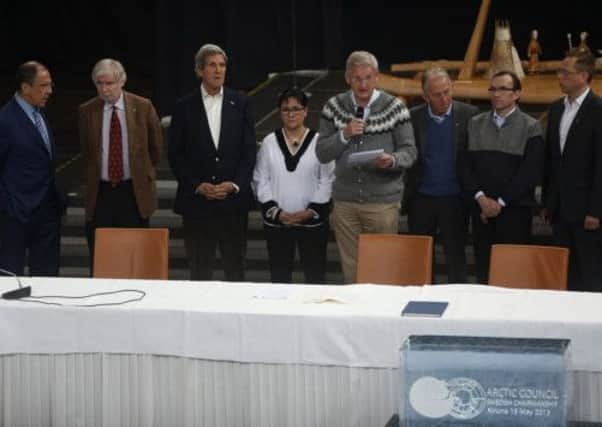Sweden: Arctic Council vote to admit China, India


The organisation, which co-ordinates Arctic policy, is gaining clout as sea ice thaws to open up trade routes and competition for oil and gas – estimated at 15 per cent and 30 per cent respectively of global undiscovered reserves – intensifies.
China has been active in the polar region, becoming one of the biggest mining investors in Greenland and recently agreeing a free trade deal with Iceland. Shorter shipping routes across the Arctic Ocean would save its companies time and money.
Advertisement
Hide AdAdvertisement
Hide AdThe council includes the United States, Russia, Canada and Nordic nations. Observer status gives countries the right to listen in on meetings and propose and finance policies.
China, Japan, India, South Korea, Singapore and Italy were all granted observer status yesterday. A decision on the European Union’s entry as an observer was deferred.
Ministers suggested the inclusion of the energy-hungry nations at the Arctic Council will force them to uphold the diplomatic panel’s core goals of safeguarding the region.
“There is no such thing as a free lunch,” said Norwegian foreign minister Espen Barth Eide. “By becoming an observer you’re also signing up to the principles embodied by this organisation, and that is why we have been working hard to make that happen.”
“Despite the varied interests we have heard today from the permanent participants, there is nothing that should unite us quite like our concern for both the promise and challenges of the northernmost reaches of the Earth,” US secretary of state John Kerry told the meeting in Sweden’s northern town of Kiruna.
“The consequences of our nations’ decisions do not stop at the 66th parallel,” Mr Kerry said, referring to the latitude of the Arctic Circle.
Canada’s minister to the council, Leona Aglukkaq, voiced mild but restrained discomfort with the new observers to the council, which she said was created “by northerners, for northerners, before the Arctic was of interest to the rest of the world”.
Canada will chair the council for the next two years.
The council ruled the Europe Union could observe meetings until a final decision on its status was taken. EU members France, Germany, Spain and Britain have observer status.
Advertisement
Hide AdAdvertisement
Hide AdDiplomats said Canada and other Arctic states objected to an EU ban on imported seal products. Indigenous groups say they depend on the seal trade.
Russia has long been sceptical of letting in the European Union in as an observer, arguing it has representation through its members Sweden, Finland and Denmark.
The late night meeting on Tuesday over whether to accept the observers was described as “tense” by one Western diplomat.
Indigenous groups have expressed concern that the number of observers could dilute their voice as traditional cultures are threatened by a possible influx of oil and mining projects.